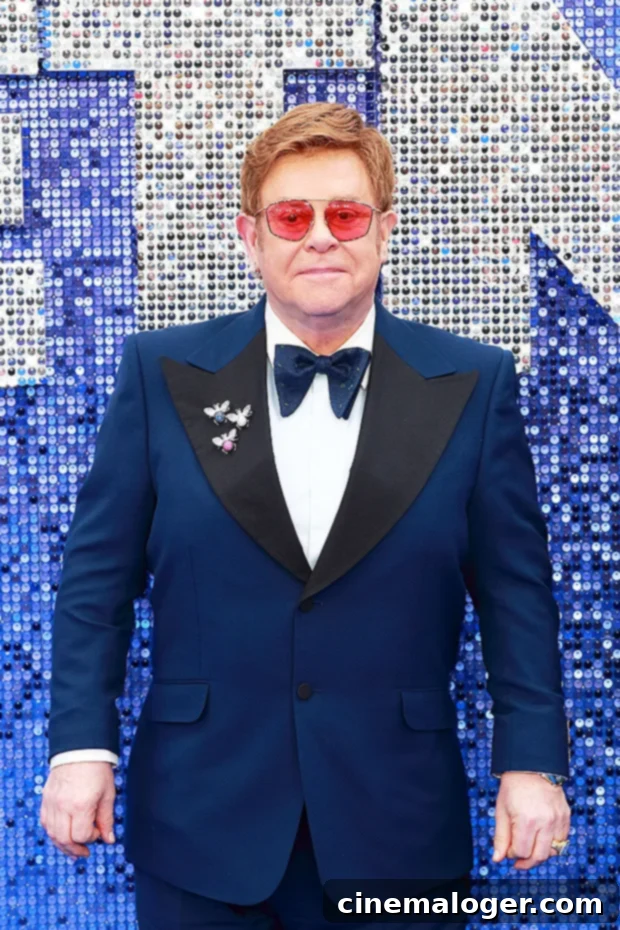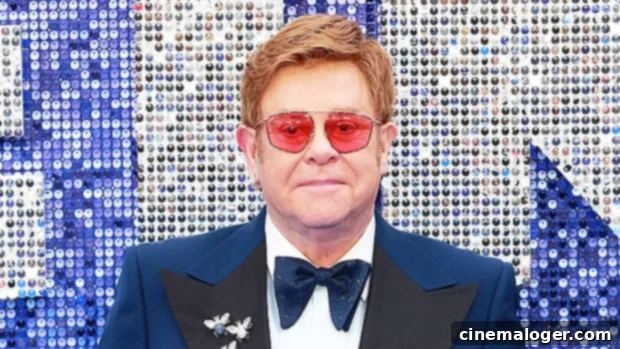Sir Elton John and David Furnish Champion Systemic Change: Amplifying Racial Justice and Equality Through Global Advocacy
In a profound and urgent conversation as part of TIME 100 Talks on June 25, legendary musician Sir Elton John and his husband, David Furnish, engaged in a candid discussion with journalist Katie Couric. The interview delved into some of the most pressing global issues of our time, including police brutality, systemic racism, the ongoing fight for equality, and the widespread impact of the COVID-19 pandemic. Their powerful dialogue underscored the critical need for fundamental change in how societies operate and how individuals perceive and treat one another. As founders of the renowned Elton John AIDS Foundation, the couple shed light on their organization’s commitment to not only combatting the global AIDS epidemic but also actively supporting and amplifying the vital calls for social justice, particularly in the context of racial equality.
The timing of the interview was particularly poignant, arriving amidst a wave of global protests and sustained activism against police brutality and systemic racism. These demonstrations were ignited by the horrific murder of George Floyd, an unarmed Black man, at the hands of then-Minneapolis police officer Derek Chauvin on May 25. Floyd’s death, captured on video and widely circulated, served as a stark and painful reminder of the deeply entrenched racial injustices that continue to plague societies, prompting a global reckoning and an intensified demand for accountability and reform. Sir Elton John and David Furnish’s participation in this crucial discourse highlighted the interconnectedness of various social justice movements and the collective responsibility to address these injustices head-on.
Katie Couric initiated the discussion by asking Elton and David for their reflections on the “transformational times we’re living in.” Sir Elton John’s response, though succinct, was loaded with profound meaning and a clear call to action: “Change.” He articulated a compelling vision for a world that must evolve, stating, “It amplifies that the world has to change. It has to change the way it is about the planet and it has to change the way people think about Black lives.” His words resonated with the palpable energy of the moment, acknowledging that the Black Lives Matter movement and the associated protests had gained unprecedented strength and global visibility, signifying a potentially pivotal moment in history. The intensity of public outcry and the sheer scale of engagement, he suggested, indicated a turning point unlike any seen before.
Elton John emphasized the historical context, acknowledging that the world has witnessed the killing of Black people by police countless times before. However, he stressed, “this, I think is a real turning point and it has to happen. We have to make sure it happens.” This sentiment conveyed an urgent sense of responsibility, suggesting that the current wave of activism must translate into concrete, lasting societal reforms. He directly addressed the insidious nature of systemic racism, declaring, “The system is rigged against Black people from the word ‘go.’” This powerful statement speaks to the deep-seated structural inequalities that impact Black communities across various aspects of life, from education and housing to employment opportunities and, most critically, the justice system. The very fabric of society, he argued, has been designed in a way that disadvantages and marginalizes Black individuals, creating obstacles that hinder their progress and threaten their safety.
The conversation further revealed the Elton John AIDS Foundation’s expanded role in this broader struggle for justice. While primarily focused on combatting the global AIDS epidemic, the Foundation has a long-standing history of supporting marginalized communities and advocating for human rights. Elton explained, “From the educational point of view, we are now noticing within our own organization, which is concentrated on AIDS and helping people with AIDS, to amplify that situation as well. I hope out of this comes some real change.” This pivot underscores the understanding that health disparities, including the disproportionate impact of AIDS on Black communities, are often inextricably linked to systemic racism and socioeconomic inequalities. By leveraging its platform, resources, and expertise in advocacy, the Foundation aims to contribute meaningfully to the wider movement for racial justice, recognizing that true health equity cannot be achieved without addressing fundamental societal injustices.
The Foundation’s commitment to “amplifying” change means more than just a verbal endorsement. It signifies a strategic recognition of the intersectionality of various forms of oppression. Decades of work in public health have provided the Elton John AIDS Foundation with invaluable insights into the social determinants of health, revealing how factors like poverty, discrimination, lack of access to education, and systemic biases exacerbate health crises. For instance, the fight against HIV/AIDS has consistently highlighted how marginalized groups, including Black communities, often face greater barriers to prevention, testing, treatment, and care due to systemic issues. By applying this understanding, the Foundation can offer its support to organizations on the front lines of racial justice, share advocacy strategies, and help ensure that the voices of those most affected are heard and uplifted. This nuanced approach demonstrates a sophisticated understanding that fighting one injustice often requires confronting others that are deeply intertwined.
Beyond racial justice, the interview with Katie Couric also touched upon the devastating impact of both AIDS and the emerging COVID-19 pandemic on the Black community. Sir Elton John and David Furnish highlighted the critical need for equal access to fundamental resources for everyone, regardless of their background or identity. The disproportionate rates of infection, severe illness, and death from COVID-19 among Black populations in many countries vividly illustrate the lasting effects of systemic inequalities. Factors such as a higher prevalence of essential workers, limited access to quality healthcare, pre-existing health conditions often linked to socioeconomic disparities, and distrust in medical systems due to historical abuses, all contribute to these alarming disparities. Similarly, the AIDS epidemic has historically, and continues to, disproportionately affect Black communities, especially Black gay men and transgender women, due to a complex interplay of systemic racism, stigma, and inadequate access to culturally competent healthcare services. The couple’s focus on these health crises underscored the urgent necessity of addressing the root causes of inequity to protect the most vulnerable members of society.
As prominent figures in the LGBTQ+ movement, Elton and David also shared their thoughts on what it means to be influential leaders in this space, especially in light of the landmark Supreme Court ruling on June 15. This significant decision affirmed that a key provision of the 1964 Civil Rights Act protecting employees from discrimination “because of sex” extends to gay, lesbian, and transgender people, making workplace discrimination based on sexual orientation and gender identity illegal across the United States. The couple expressed their profound satisfaction with this ruling, viewing it as a crucial step forward in the ongoing struggle for LGBTQ+ rights and a testament to years of dedicated activism. This legal victory, they suggested, provides a beacon of hope and a model for how persistent advocacy can lead to tangible improvements in human rights. They drew parallels between the fight for LGBTQ+ equality and the struggle for racial justice, recognizing that both movements are fundamentally about ensuring dignity, respect, and equal protection under the law for all individuals.
Their advocacy across these diverse yet interconnected fronts – from racial justice to LGBTQ+ rights and global health equity – showcases a holistic understanding of human rights. Sir Elton John and David Furnish exemplify how influential voices can be leveraged to challenge discrimination and champion equality in all its forms. Their message is clear: change is not only necessary but also achievable, provided there is collective will, sustained effort, and a willingness to confront uncomfortable truths about societal injustices. The interview served as a powerful call to action, urging everyone to recognize their role in creating a more just and equitable world, where the dignity and rights of every individual are respected and protected. It reinforced the idea that solidarity across movements is essential, and that the fight for one marginalized group’s rights strengthens the fight for all.

(Photo credit: SplashNews)
